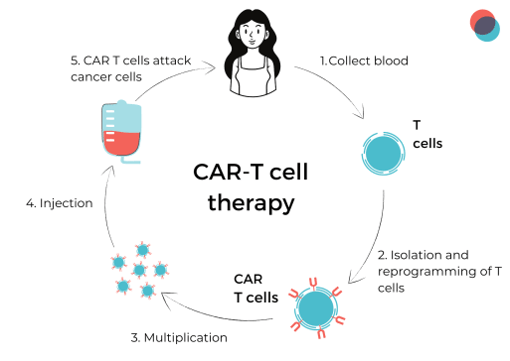The promise of CAR-T cell therapy
January 27th, 2022, by Labtoo's team
How does CAR-T cell therapy work?
This therapy is primarily used to treat cancers.
The process involves the infusion of modified T cells that carry a chimeric antigen receptor (CAR) on the cell membrane. The outer domain of this receptor will then be able to recognize a specific molecule on a tumour cell activating the molecule's internal signalling, which stimulates the T cell to attack the cancer cell.

How are the cells obtained?
T cells are obtained by taking them from the patient, in a process called leukapheresis. After collection, the cells are modified to carry the chimeric antigen receptor CAR.
Once the cells are ready, they are reinjected into the patient and will start fighting the cancer cells.
This cell therapy promises very favorable results in eliminating cancers, with the latest trials on severe forms of blood cancer showing up to 93% remission rates.
And the negative points?
Of course, this should not be seen as a miracle cure against all cancers. Unfortunately, there are not only positive points but also significant disadvantages, as the side effects can be very restrictive, even fatal. A lot of research still needs to be done and the companies developing this type of therapy intended to reduce the occurrence of these side effects to a minimum.
To know more about it
Labiotech.eu is full of interesting articles and information. One of these articles was used to build this blog post and if you are inclined to have more information on the subject, do not hesitate to consult their article: A cure for cancer? CAR-T cell therapy revolutionizes oncology. You will find the link in the first comment of this post.